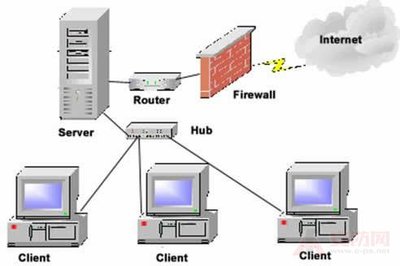答:尽管它们能提供一些有限的保护,软件或个人防火墙有很多弱点
好处
个人防火墙可用来防止某些windows内嵌的很难终止甚至无法
个人防火墙可防止某些拒绝服务的攻击,主要是由于假装无法到达而
个人防火墙可以堵住你疏忽的电脑安全漏洞,例如文件或打印共享或
这个谈不上是好处了。个人防火墙可以阻断某些特洛伊木马
个人防火墙让其它软件进行端口漏洞扫描时遇到麻烦
坏处
由于个人防火墙运行在被保护的电脑上,它可以被重新配置、禁用
个人防火墙不能保护你避免严重的攻击,因为它不过是运行于线路末
个人防火墙很烦人的。它把正常的后台通讯当作有害的活动
个人防火墙不是即插即用的工具,不是你可以下载、运行然后就高枕
个人防火墙经常妨碍合法的网络活动。虽然大部分防火墙默认情况下
个人防火墙不会阻止、发现、清楚传统的没有网络活动的病毒
很多ISP不支持个人防火墙。例如,RoadRunner要求在提供任何高级技术支持时用户要完全卸载个人防
有些软件运行时会探测网络连接是否还有效,阻止这些探测会导致连
阻止已关闭端口的TCPRST回应有副作用,任何要连接到这些端口的过程需要相当长的时
需要更多的信息,可参考"家用电脑防火墙指南",或更多的
Q: What about the so-called personal firewalls? Are they anygood?
A: While they can provide some limited protection, softwareor
personal firewalls have many weaknesses. No matter what the
manufacturer of any personal firewall would like you to believe,there
is no software product which will protect you against all typesof
attacks, nor from an "internal" compromise, that is, if you(or
somebody else with access to your PC) run software on yourmachine
which takes control of that machine and subverts the firewall.While
we STRONGLY recommend that a hardware firewall be used, inmost
circumstances, you are better off with a software firewall thanwith
no firewall, due to the difficulties in closing off the manyinsecure
services bundled with Windows. We will list the pros and cons ofusing
personal firewalls below.
Personal firewall PROs
· A personal firewall can be used to preventaccess to certain
services built into Windows which are notoriously difficult oreven
impossible to disable, such as NetBIOS.
· A personal firewall can prevent certain DenialOf Service
attacks, most notably disconnects due to spoofed unreach aka"click" -
this is perhaps its most important (and some would say onlyunique)
contribution to your security.
· A personal firewall can block inadvertent holesin your
computer's security if you unintentionally leave open services suchas
file or print sharing or an FTP daemon. Instead of relying ona
firewall, however, you should check your security (try the ShieldsUP!
site) and just fix these vulnerabilities.
· This is barely a pro at all. Personal firewallscan block
the action of certainTrojan horses, by preventing them from"phoning
home" and by preventing a would-be attacker from connecting tothem,
but this is false security! Trojan horses can alreadycircumvent
personal firewalls, and this will become typical behavior. Theonly
effective protection against trojan horses is to totallyavoid
untrusted software, and scan even "trusted" software with an
up-to-date virus scanner. Even then, active scriptingvulnerabilities
which are unfortunately common in popular browsers and mailprograms
may still expose your system to viruses or trojan horses. Whileno
firewall can totally protect against an attack from within,dedicated
hardware firewalls stand a much better chance at blocking atrojan's
activity. Even then, you should be aware that a trojan candisguise
its network traffic as legitimate traffic to pass through afirewall
unaffected, or even worse, can attach to or interface with an
application which is normally allowed to access the internet,
circumventing the "per-application" restrictions in certainpersonal
firewalls.
· A personal firewall can make it impractical forothers to
port scan you to identify your vulnerabilities. It does so bymaking
scanning more time consuming, by preventing the usual RST responseon
closed ports so that the scanner has to wait for theconnection
attempt to time out. The personal firewall can also defeatautomated
scanning for active hosts by disabling ICMP ECHO replies (aka
"pings").
Personal firewall CONs
· Since a personal firewall runs on the samecomputer as it
protects, it can be reconfigured, disabled, or otherwise subvertedby
malicious software running on your computer.
· Personal firewalls cannot protect you againstserious
relatively slow connection, rather than at the ISP'shigh-bandwidth
side. Consider if a river is threatening to overflow, you have totry
to stop the flood with barriers at the river banks. If you don'tdo
that, by the time 10-foot flood waters surround your house,it's
useless to try to stop it just by sandbagging your front door. Thisis
a very important point, so let me repeat it: No matter whatclever
software or hardware you run at home, you will always be vulnerableto
flood attacks.
· Personal firewalls are very noisy. They reportnormal
background traffic as harmful activity, leading to panic amongusers
of personal firewalls who in turn cause a great deal of grief forISP
abuse desks, who now receive endless reports of "attacks" everytime
someone executes a totally innocuous "ping" command.
· Personal firewalls are not a "plug and play"magic fix that
you download, run, and forget. They take time to set up, canbe
confusing to people without a lot of computer experience, andrequire
constant configuring and updating to adapt to new attacks.
· Personal firewalls often get in the way of yourlegitimate
network activity. Although most firewalls are configured by defaultto
allow things like web browsing, they may need to be taught aboutDCC,
identd, ICQ, net gaming, etc.
· Personal firewalls cannot block, find, or removetraditional
viruses which do not generate any network activity; that is therole
of virus-scanning software. For example, if you get an emailvirus
attachment, your firewall will let it through since email by itselfis
an allowed activity, and if you run the virus designed to eraseyour
disk, it can still do so, since that doesn't involve anynetwork
· Many ISPs won't support users with firewalls.For example,
Road Runner requires firewalls be totally uninstalled beforeany
advanced technical support. They just create too many support
headaches. Indeed, the first troubleshooting step for a user witha
firewall should be to make sure the firewall isn't interferingbefore
calling support.
· Some providers legitimately perform certainprobes to
determine if a connection is still active. Blocking these probescould
cause you to get disconnected.
· Blocking TCP RST replies on closed ports has theside effect
that any connection attempt to a closed port takes an extremelylong
time (sometimes over a minute) to fail. This can affect mail, ftp,and
IRC servers which attempt to make an identd connection, and expectit
to succeed or fail quickly.
For more information, see the home PC firewall guide and thismuch
more critical view of "personal firewalls" [ext. links]. Almostall
reasonably adequate personal firewalls are commercial softwarecosting
anywhere from $30 to much more, often with additional annual"update"
license fees. Note that Windows XP comes with its built inInternet
Connection Firewall.
 爱华网
爱华网



